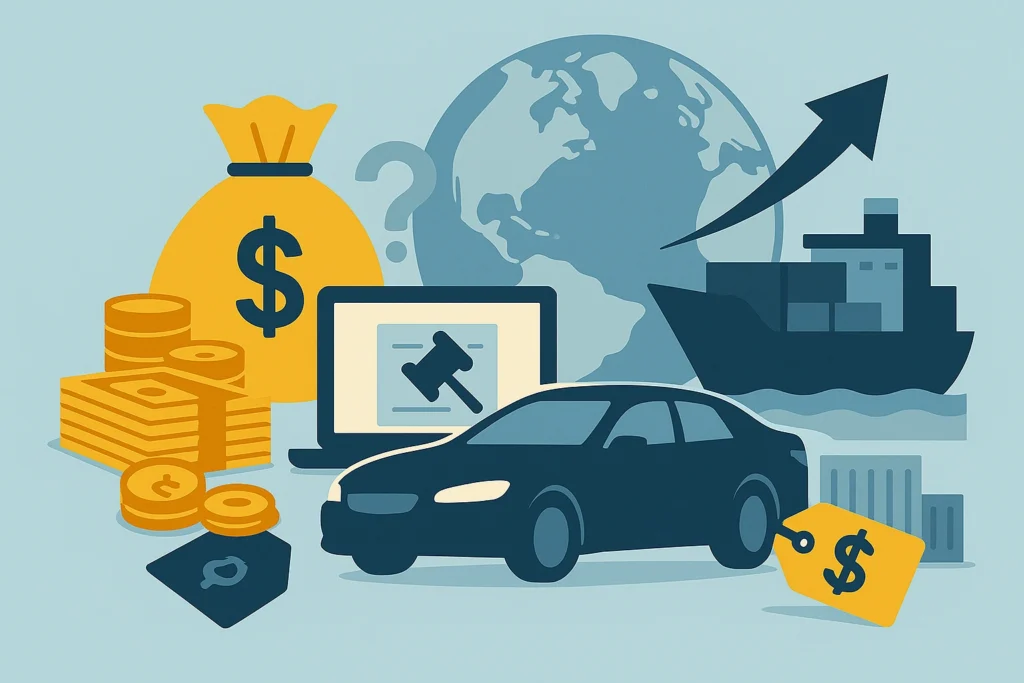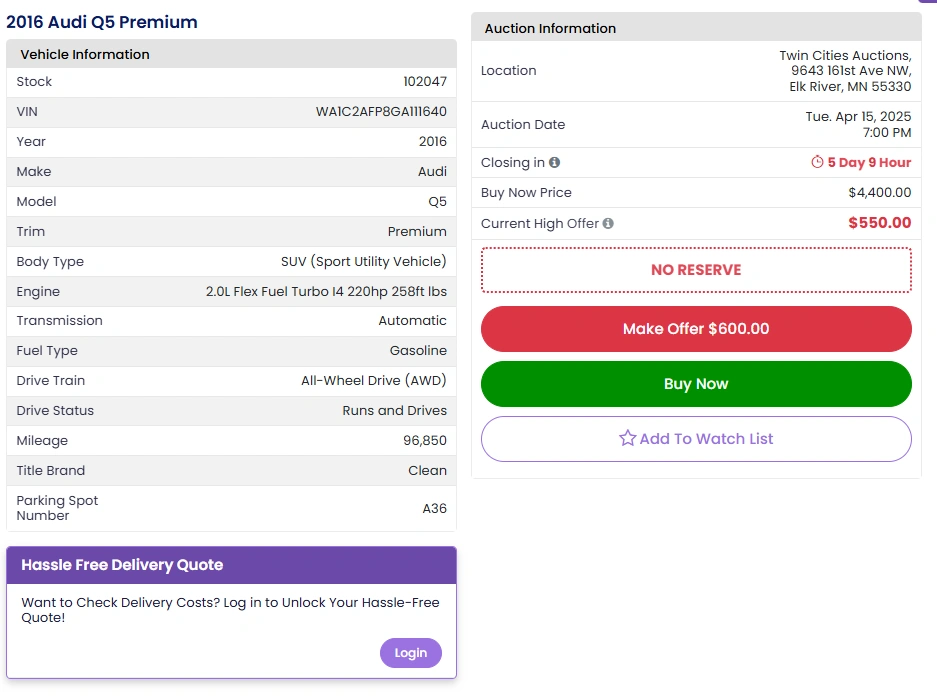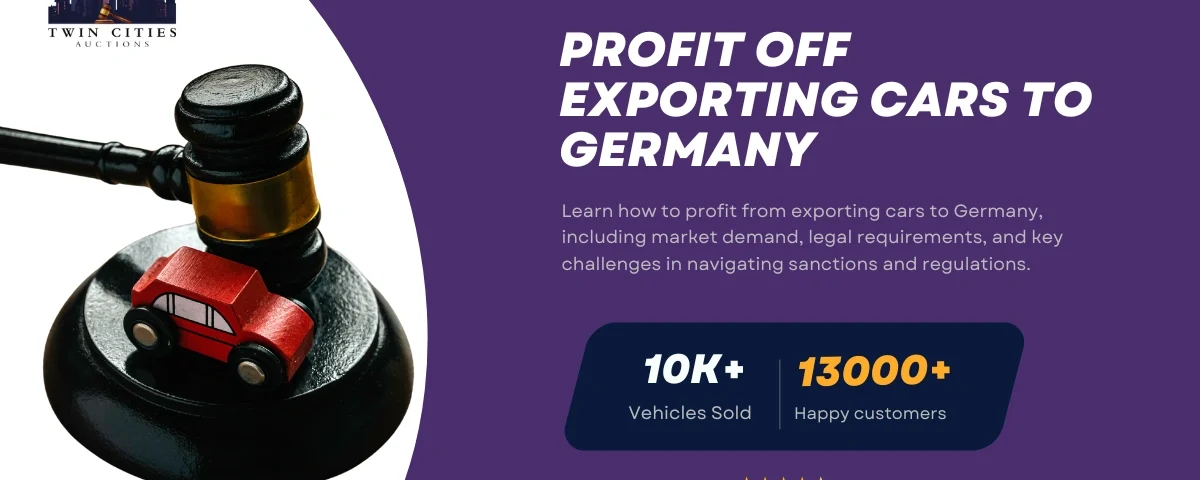Germany’s used‑car market is booming: in 2023 over 600,000 pre‑owned passenger vehicles, worth nearly €12 billion, entered the country as cost‑savvy drivers and fleet operators sought late‑model quality at used‑car prices.
U.S. exporters who cracked this market have seen profit margins of 18–22 percent within months. Below, you’ll find Germany’s verified import rules, cost models, and shipping routes so you can drive your export business to success.

Key Takeaways
- Germany imported over 600,000 used cars in 2023, reflecting a strong demand for pre-owned vehicles.
- Importing vehicles into Germany incurs a 10% import duty and a 19% Value Added Tax (VAT) on the CIF (Cost, Insurance, and Freight) value plus duty.
- Compliance with Euro 6 emissions standards and possession of a valid Certificate of Conformity (CoC) are mandatory for vehicle registration in Germany.
- All customs declarations must be processed electronically through Germany’s ATLAS system to ensure efficient clearance.
- Major German ports handling vehicle imports include Hamburg, Bremerhaven, and Wilhelmshaven, offering robust logistics infrastructure.
- Sourcing vehicles from reputable U.S. auto auctions can provide access to a wide selection of late-model cars suitable for the German market.
Understanding the German Market
Germany’s automotive culture is one of the strongest in the world, with consumers placing high value on engineering quality and long-term reliability.
The country has seen increasing interest in hybrid and electric vehicles, especially in urban areas where environmental policies are tightening.
Used American cars—particularly SUVs and trucks—can attract niche buyers due to their size and power. However, German buyers typically expect thorough documentation, accurate mileage records, and full maintenance histories.
| Metric | Figure |
| Used Cars Imported (2023) | 600,000+ units |
| Estimated Market Value | €11.8 billion |
| Year‑over‑Year Growth | ~5 percent |
Source: German Association of the Automotive Industry (VDA)
Regulations and Compliance
To successfully export a vehicle to Germany, you must meet strict EU import requirements. These include a 10% import duty, 19% VAT on the CIF value plus duty, and Euro 6 emissions compliance.
A Certificate of Conformity is mandatory for EU type-approval, and all customs declarations must be processed electronically via Germany’s ATLAS system.
Understanding and preparing for these regulations is essential to avoid costly delays or shipment rejections.
| Requirement | Details |
| Import Duty | 10 percent of CIF |
| Value Added Tax (VAT) | 19 percent on CIF plus duty |
| Emissions Standard | Euro 6 for all imports |
| Certificate of Conformity | Mandatory EU type‑approval document |
| Customs Declaration (ZOLL) | Electronic via ATLAS system |
Source: German Customs (Zoll)
Building Your Landed‑Cost Model
For a €25,000 vehicle:
| Cost Item | Rate | Calculation |
| CIF Cost | — | €25,000 |
| Import Duty | 10 percent | €2,500 |
| VAT | 19 percent | (25,000 + 2,500)×0.19 = 5,175 |
| Miscellaneous Fees | ~1 percent | €25,000×0.01 = €250 |
| Total Landed | — | €32,925 |
Source: German Customs (Zoll)
Logistics and Shipping Routes
The choice between roll-on/roll-off (RoRo) and container shipping can greatly affect your delivery timeline and budget.
RoRo is more cost-effective for fully operational vehicles but offers less protection, while container shipping is ideal for high-value or non-running units.
Port congestion and seasonal demand—especially around major European holidays—can cause delays, so advance planning is crucial.
Consider working with a freight forwarder experienced in automotive logistics to streamline customs and scheduling.
| Route | Transit Time | Port |
| U.S. East Coast → Hamburg | 12–15 days | Hamburg |
| U.S. Gulf Coast → Bremerhaven | 14–18 days | Bremerhaven |
| U.S. West Coast → Wilhelmshaven | 18–22 days | Wilhelmshaven |
Source: Maersk
Financing and Payment Security
Recommended payment terms:
| Method | Risk Level | Best Use |
| Letter of Credit | Low | New partners; high‑value loads |
| Open Account | High | Established buyers |
| Escrow | Medium | Guarantees delivery before payment |
Source: U.S. Export‑Import Bank
Why Auctions Are a Smart Choice for Car Purchases
Auctions can be an excellent source for late-model vehicles with clear chains of title and affordable pricing. Twin Cities Auctions, based in Minnesota, is one such reputable auction house that offers a wide range of vehicles at competitive prices.
Key Benefits of Buying from Auctions:
- Wide Selection: Auctions like Twin Cities Auctions offer a variety of vehicles, from low-budget cars to high-end models.

- Competitive Pricing: Auctions often offer vehicles at prices below retail value, enabling dealers to maximize their profit margins.

- Transparency: Auctions provide full vehicle history reports, so you know exactly what you’re buying.

- Convenient Bidding: Many auctions offer online bidding for your convenience, making it easier to source vehicles without being physically present.
Twin Cities Auctions: A Smart Vehicle Sourcing Choice
For those in the automotive industry, Twin Cities Auctions offers an excellent platform for sourcing quality vehicles at competitive prices.
Whether you are just starting or expanding your business, this auction house provides transparency, competitive pricing, and a broad selection.
| Feature | Description |
| Inventory Variety | Wide range of cars, trucks, and SUVs available |
| Competitive Pricing | Below-market pricing allows for higher profit margins |
| Vehicle History Reports | Detailed history reports for every vehicle |
| Online Bidding | Convenient online bidding options for dealers |
| Financing Options | Financing available to help with inventory purchases |
Conclusion
Germany’s robust demand for quality used cars makes it a prime market for U.S. exporters. By adhering to EU import standards, precisely modeling landed costs, optimizing logistics, and sourcing smartly, you can achieve strong, sustainable profit margins.
Public Auctions Made Easy with Twin Cities Auctions
At Twin Cities Auctions, we strive to simplify the public auction process for everyone. You don’t need a dealer license to buy or sell cars here. Our online auctions are designed to be user-friendly and open to the public, ensuring that individuals of all experience levels—from novice buyers to experienced sellers—can participate with ease.
With a focus on transparency and ease of use, we provide all the tools and support you need to confidently participate in the auction process. Start your car buying or selling journey with us today and experience how straightforward and effective our auction system can be!
Looking for more options? Explore our comprehensive list of all available car auctions across the United States. Your next deal might be just a click away!
FAQ
What are Germany’s auto import duties?
Import duty is 10 percent of CIF value.
What VAT applies?
VAT is 19 percent on CIF plus duty.
Can I export used cars to Germany?
Yes—Euro 6 compliance and EU Certificate of Conformity are required.
How long does customs clearance take?
Typically 3–5 business days with full documentation.
Are emissions tests mandatory?
Yes—Euro 6 certification is mandatory.


